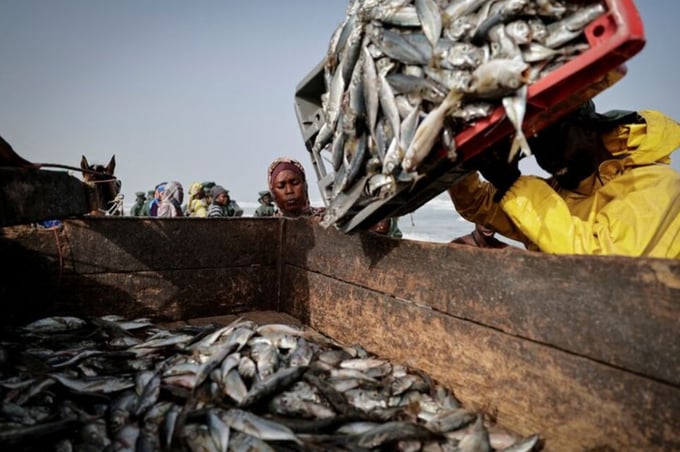November 26, 2025 | 20:32 GMT +7
November 26, 2025 | 20:32 GMT +7
Hotline: 0913.378.918
November 26, 2025 | 20:32 GMT +7
Hotline: 0913.378.918

A vendor waits to buy fresh fish from fishermen in Fass Boye, Senegal, March 20, 2024.
In its latest biennial report on the state of world fisheries, the Rome-based Food and Agriculture Organization (FAO) said global fisheries and aquaculture production in 2022 hit a record 223.2 million tonnes.
Aquaculture, also known as aquafarming, is the cultivation of aquatic organisms such as fish, crustaceans, mollusks, and aquatic plants and algae in controlled environments.
FAO said aquaculture production hit an unprecedented 130.9 million tonnes in 2022, of which 94.4 million tonnes were aquatic animals - 51% of the total aquatic animal production.
"These numbers demonstrate the potential for aquaculture to feed the growing world population," FAO assistant director general, Manuel Barange, told reporters.
"It's been the fastest growing food production system (in the world) for the last five decades," he said.
However, just 10 countries - China, Indonesia, India, Vietnam, Bangladesh, the Philippines, South Korea, Norway, Egypt and Chile - accounted for almost 90% of all aquaculture production, and FAO said it was important to develop the industry elsewhere, especially in Africa, which is currently a net importer of fish.
Critics say aquafarming can damage the environment and put disease and invasive species into the wild, but FAO says this can be avoided by having proper regulation and monitoring.
Friday's report said global per capita annual consumption of aquatic animal foods, a key source of protein for millions around the world, totalled 20.7 kg in 2022, up from 9.1 kg in 1961, and was set to rise further in the years ahead.
The haul from captured fisheries has remained stable since the late 1980s, equalling 92.3 million tonnes in 2022.
However, latest data showed 37.7% of fish stocks in the world's marine fisheries were classified as overfished in 2021 - a continuous, increasing trend since 1974 when the figure stood at just 10%, FAO said.
"The issue of sustainability is of great concern to us," FAO's Barange said, adding however, that many larger commercial fisheries were being well managed, including tuna stocks, now approaching 90% levels of sustainability.
"This is a remarkable improvement over the last decade," he said. Barange said that 80% of the top 10 marine species consumed by humans, were being sustainably exploited.
(Reuters)

(VAN) China’s cooking oil is suddenly flooding into India. It all comes down to a soybean surplus that Beijing doesn’t quite know what to do with.

(VAN) An Giang promotes supply-demand connections, standardizes quality and builds value chains, creating a foundation for sustainable bird’s nest development and aiming to expand exports.
/2025/11/24/5339-4-nongnghiep-075331.jpg)
(VAN) Recently, the conference on 'Sustainable Fisheries Linkage Chain - Tilapia for Export' took place in Tien Hai commune, Hung Yen province.
/2025/11/21/4309-2-153400_128.jpg)
(VAN) Green and low-emission rice is paving the way for Vietnamese rice to enter high-end markets, marking the beginning of a transformation journey toward greening and elevating the national rice brand.

(VAN) ‘Right to Win’ outlines a national action plan that shapes a new vision for Viet Nam’s agriculture in an era of renewal and global integration.

(VAN) Lam Dong’s farmed sturgeon output this year is expected to reach 2,300 tons, worth VND 450 billion, affirming the brand’s position on the market.

(VAN) A surge in Ukrainian egg exports, largely driven by soaring sales to the UK over the last few years, has notably pushed up egg prices on the domestic market.